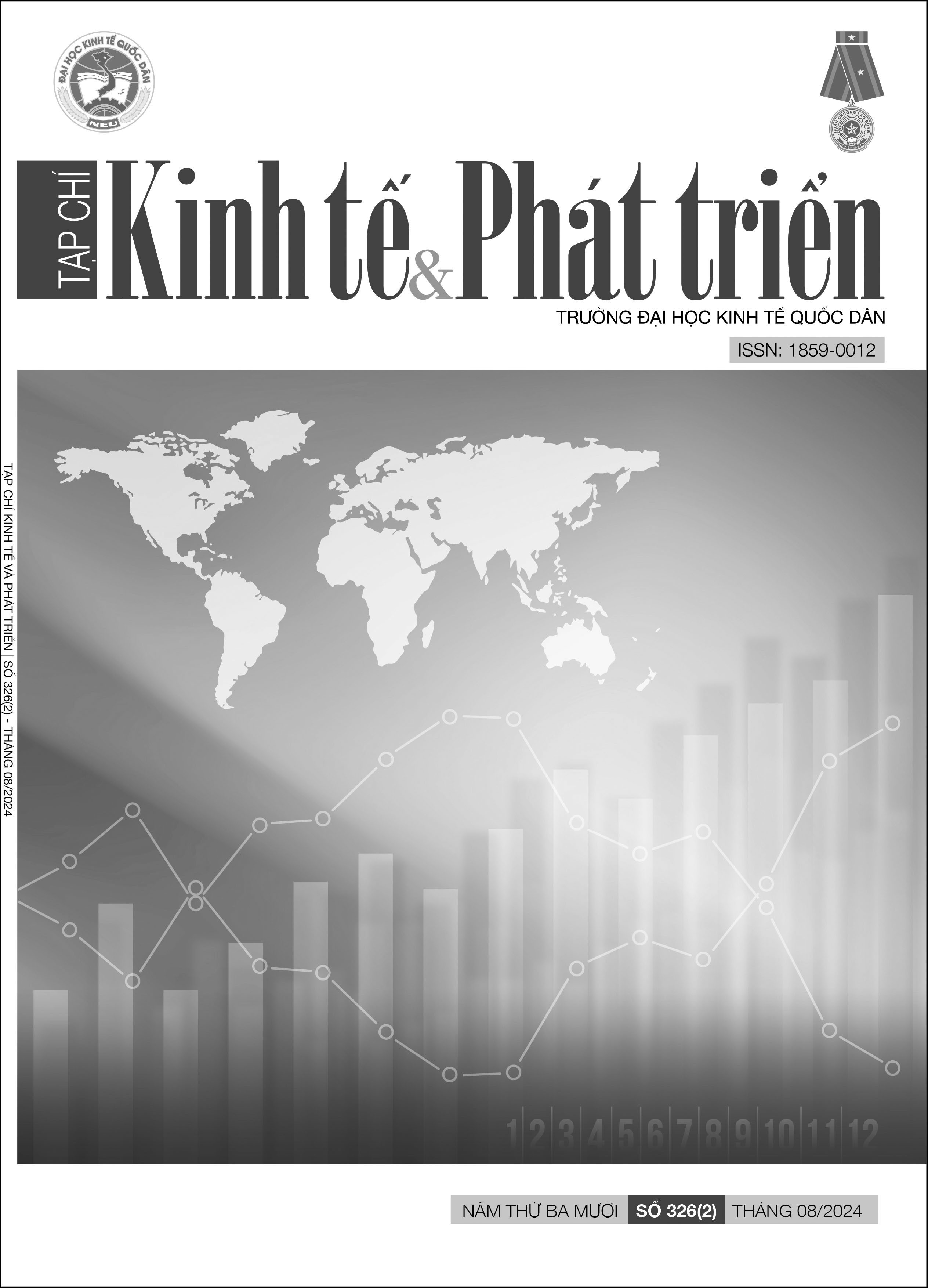Phân tích trắc lượng thư mục các xu hướng nghiên cứu trong lĩnh vực nghiên cứu về trung hòa các-bon
DOI:
https://doi.org/10.33301/JED.VI.1905Từ khóa:
Trung hòa các-bon, biến đổi khí hậu, phân tích trắc lượng thư mụcTóm tắt
Trong bối cảnh biến đổi khí hậu và nóng lên toàn cầu, trung hòa các-bon đã trở thành mục tiêu quan trọng của cộng đồng quốc tế. Nghiên cứu này sử dụng phương pháp phân tích trắc lượng thư mục để đánh giá sự phát triển và xu hướng nghiên cứu về trung hòa các-bon từ năm 2000 đến nay. Bằng cách phân tích 2827 ấn phẩm liên quan từ cơ sở dữ liệu Scopus qua công cụ Biblioshiny trên Rstudio, nghiên cứu này cung cấp bức tranh toàn cảnh về các xu hướng nghiên cứu trong lĩnh vực trung hòa các-bon. Kết quả cho thấy sự gia tăng đáng kể về số lượng ấn phẩm trong những năm gần đây, các nghiên cứu trong lĩnh vực này chủ yếu tập trung vào các khía cạnh ứng dụng thực tiễn, kỹ thuật, chính sách, và kinh tế của trung hòa các-bon. Năng lượng tái tạo, công nghệ chuyển đổi các-bon, và công nghệ thu giữ và lưu trữ các-bon đang là những điểm nóng nghiên cứu trên thế giới. Nghiên cứu này phân tích toàn diện về các xu hướng nghiên cứu hiện tại và đề xuất các định hướng cho các nghiên cứu trong tương lai.
Tài liệu tham khảo
Cao, J., Zhang, W., Li, Y., Zhao, C., Zheng, Y., & Yu, B. (2021), ‘Current status of hydrogen production in China’, Progress in Chemistry, 33(12), 2215–2244, https://doi.org/10.7536/pc201128.
Das, N., Murshed, M., Rej, S., Bandyopadhyay, A., Hossain, M.E., Mahmood, H., Dagar, V., & Bera, P. (2023), ‘Can clean energy adoption and international trade contribute to the achievement of India’s 2070 các-bon neutrality agenda? Evidence using quantile ARDL measures’, International Journal of Sustainable Development & World Ecology, 30, 262–277, https://doi.org/10.1080/13504509.2022.2139780.
Desalegn, B., Gebeyehu, D., & Tamirat, B. (2022), ‘Wind energy conversion technologies and engineering approaches to enhancing wind power generation: A review’, Heliyon, 8(11), e11263, https://doi.org/10.1016/j.heliyon.2022.e11263.
Falkner, R. (2016), ‘The Paris Agreement and the new logic of international climate politics’, International Affairs, 92(5), 1107–1125, https://doi.org/10.1111/1468-2346.12708.
Feng, Z.K., Niu, W.J., Cheng, C.T., Zhou, J.Z., & Yang, T. (2022), ‘China’s hydropower energy system toward các-bon neutrality’, Frontiers in Engineering Management, 9(4), 677–682, https://doi.org/10.1007/s42524-022-0196-2.
Kempitiya, T., Sierla, S., De Silva, D., Yli-Ojanperae, M., Alahakoon, D., & Vyatkin, V. (2020), ‘An artificial intelligence framework for bidding optimization with uncertainty in multiple frequency reserve markets’, Applied Energy, 280, 115918, https://doi.org/10.1016/j.apenergy.2020.115918.
Li, Y., Feng, T.-t., Liu, L.-l., & Zhang, M.x. (2023), ‘How do the electricity market and các-bon market interact and achieve integrated development?–A bibliometric-based review’, Energy, 265, 126308, https://doi.org/10.1016/j.energy.2022.126308.
Lin, H., Zhou, Z., Chen, S., & Jiang, P. (2023), ‘Clustering and assessing các-bon peak statuses of typical cities in underdeveloped Western China’, Applied Energy, 329, 120299, https://doi.org/10.1016/j.apenergy.2022.120299.
Liu, F., Khan, Y., & Marie, M. (2021), ‘Các-bon neutrality challenges in Belt and Road countries: What factors can contribute to CO2 emissions mitigation?’, Environmental Science and Pollution Research, 30, 14884–14901, https://doi.org/10.1007/s11356-022-22983-0.
Myeongnam, P., Kim, B., Hong, G.H., & Shin, D. (2022), ‘Technology trends of smart abnormal detection and diagnosis system for gas and hydrogen facilities’, Journal of Korean Institute of Gas, 26(4), 41–57. https://doi.org/10.7842/kigas.2022.26.4.41.
Pielke, R. A., Knutson, T., & Smith, R. B. (2018), ‘The Role of Các-bon Neutrality in Climate Policy: A Comprehensive Review’, Global Environmental Change, 52, 235-246.
Rabbi, M. F., Popp, J., Mate, D., & Kovacs, S. (2022), ‘Energy security and energy transition to achieve các-bon neutrality’, Energies, 15(21), 8126, https://doi.org/10.3390/en15218126.
Rogelj, J., den Elzen, M., Hoehne, N., Fransen, T., Fekete, H., Winkler, H., Chaeffer, R. S., Ha, F., Riahi, K., & Meinshausen, M. (2016), ‘Paris Agreement climate proposals need a boost to keep warming well below 2 degrees C’, Nature, 534, 631–639, https://doi.org/10.1038/nature18307.
Sahrin, N. T., Khoo, K. S., Lim, J. W., Shamsuddin, R., Ardo, F. M., Rawindran, H., Hassan, M., Kiatkittipong, W., Abdelfattah, E. A., Da Oh, W., & Cheng, C. K. (2022), ‘Current perspectives, future challenges and key technologies of biohydrogen production for building a các-bon-neutral future: a review’, Bioresource Technology, 364, 128088, https://doi.org/10.1016/j.biortech.2022.128088.
Shubbar, A., Nasr, M., Falah, M., & Al-Khafaji, Z. (2021), ‘Towards net zero các-bon economy: improving the sustainability of existing industrial infrastructures in the UK’, Energies, 14(18), 5896, https://doi.org/10.3390/en14185896.
Takahashi, Y., Ikeda, Y., Watanabe, H., & Itoh, J. (2022), ‘Universal smart power module (USPM) for các-bon neutral society’, In International Power Electronics Conference (IPEC-Himeji - ECCE Asia), pp. 1281–1287, Himeji, Japan.
Tang, B.-J., Guo, Y.-Y., Yu, B., & Harvey, L.D.D. (2021), ‘Pathways for decác-bonizing China’s building sector under global warming thresholds’, Applied Energy, 298, 117213, https://doi.org/10.1016/j.apenergy.2021.117213.
Wang, F., Harindintwali, J. D., Yuan, Z., Wang, M., Wang, F., Li, S., Yin, Z., Huang, L., Fu, Y., Li, L., Chang, S. X., Zhang, L., Rinklebe, J., Yuan, Z., Zhu, Q., Xiang, L., Tsang, D. C. W., Xu, L. (2021), ‘Technologies and perspectives for achieving carbon neutrality’, Innovations, 2(4), 100180, https://doi.org/10.1016/j.xinn.2021.100180.
Yang, E., Mohamed, H. O., Park, S.-G., Obaid, M., Al-Qaradawi, S. Y., Castan, P., Chon, K., & Chae, K.-J. (2021), ‘A review on self-sustainable microbial electrolysis cells for electro-biohydrogen production via coupling with các-bon-neutral renewable energy technologies’, Bioresource Technology, 320, 124363, https://doi.org/10.1016/j.biortech.2020.124363.
Yu, X., & Tan, C. (2022), ‘China’s pathway to các-bon neutrality for the iron and steel industry. Global Environmental Change-Human and Policy Dimensions’, 76, 102574, https://doi.org/10.1016/j.gloenvcha.2022.102574.
Zhang, X., Liu, Y., & Wang, J. (2023), ‘Climate Change and the Accelerated Rate of Global Warming: An Analytical Review’, Environmental Science & Policy, 130, 10-23.
Zhang, Y. Y., He, M. J., Wang, L., Yan, J. H., Ma, B., Zhu, X. H., Ok, Y. S., Mechtcherine, V., & Tsang, D. C. W. (2022), ‘Biochar as construction materials for achieving carbon neutrality’, Biochar, 4, https://doi.org/10.1007/s42773-022-00182-x.
Zhao, F.Q., Bai, F.L., Liu, X.L., & Liu, Z.W. (2022), ‘A review on renewable energy transition under China’s carbon neutrality target’, Sustainability, 14(22), 15006, https://doi.org/10.3390/su142215006.





